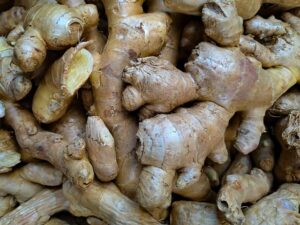In our quest for natural, home remedies, ginger has emerged as a golden root, its uses as diverse as its flavor is potent. Among its many touted benefits, ginger’s capacity to calm a queasy stomach is of particular interest to those seeking a reliable escape from the throes of nausea. From motion sickness to morning sickness, the consumption of ginger tea has long been lauded as a surefire way to settle the unsettling. But why is this aromatic herb so effective, and how does it work? We are about to explore the anti-nausea effects of ginger tea and show you how to brew what could become your go-to remedy for bouts of upset stomach, motion sickness, or a general nauseating feeling.
Chemical Components of Ginger Tea and Their Effects
The key to understanding Ginger’s medical marvels lies in its rich chemical makeup. This pungent plant contains an array of bioactive compounds, most notably gingerol — a powerful substance believed to be the primary reason behind ginger’s anti-inflammatory and antioxidant properties. When gingerol is dried and transformed into the more concentrated, potent form known as shogaol during the tea-making process, its effects become even more pronounced.
Research suggests that ginger plays a crucial role in modulating several biological responses involved in nausea, including the 5-HT3 receptors, which react to serotonin levels. Ginger’s influence here can lead to a reduction of the ‘vomiting reflex’ and, therefore, fewer feelings of nausea.
In addition to gingerol, ginger also contains other compounds such as zingerone, shogaols, and paradols that contribute to its medicinal benefits. Zingerone has been found to have anti-inflammatory effects similar to those of ibuprofen, while shogaols have potent anti-cancer properties.
https://pubmed.ncbi.nlm.nih.gov/36364048/
https://pubmed.ncbi.nlm.nih.gov/28629250/
https://pubmed.ncbi.nlm.nih.gov/32436242/
Health Benefits of Ginger Tea
Beyond its ability to quell nausea, ginger tea offers a cornucopia of health benefits. Its anti-inflammatory characteristics can aid in the relief of various types of pain, including that caused by osteoarthritis and menstrual discomfort. Additionally, ginger tea has been shown to speed up digestion and soothe the digestive tract, which can help prevent flatulence and bloating.
Its anti-inflammatory effects are also beneficial for conditions related to chronic pain, such as migraines, and can help protect against colorectal cancer by slowing the growth of cancer cells.
How Ginger Tea Works for Nausea
The efficacy of ginger as an anti-nausea agent is due in part to its positive influence on gastrointestinal function. By promoting the activity of digestive enzymes, ginger aids in the smooth digestion of food, reducing the chances of an upset stomach.
Clinical studies have validated ginger’s effectiveness in treating motion sickness, with the benefits often being seen after as little as 30 minutes from consumption. The same goes for the notoriously hard-to-treat morning sickness in pregnant women, delivering much-needed relief without any of the adverse effects that could affect the mother or child.
Preparing Ginger Tea
Now, the pot is warming, and the ginger root is at the ready. To brew a soothing cup of ginger tea, you will need an inch of fresh ginger root — peeled and sliced thinly, about 2 cups of water, and honey or lemon to taste. Place the ginger in a pot with boiling water, reduce the heat, and simmer for 10 to 15 minutes. Strain, add honey and lemon if desired, and your anti-nausea elixir is ready to be sipped.
Ginger Tea and Other Health Benefits
Ginger’s talents do not end with its prowess against nausea. Its immune-boosting and anti-inflammatory properties help in the prevention and treatment of colds and flu, making it a welcome companion in the wintertime. It also excels in reducing muscle pain and soreness due to its potential to reduce muscle cellular inflammation.
In a world where the overuse of pharmaceuticals is a common concern, ginger tea presents itself as a safe, effective, and natural alternative for a variety of ailments..
Conclusion
Ginger tea has solidified its place among the pantheon of natural remedies for its gift of relief, especially in the realm of nausea. Its rich history as a medicinal plant is backed by contemporary scientific research, which confirms its benefits. Whether you’re battling the waves of seasickness or the morning blues of pregnancy, a cup of ginger tea could be the solution you’re looking for — and the implications extend far beyond the comfort of one’s stomach.
The simplicity of its preparation and the potency of its effects make ginger tea a must-have staple in any home apothecary. With its multi-faceted health benefits, including those for the immune system and pain relief, ginger tea has earned a comprehensive place in the holistic approach to health.
Brew a pot, sip it slowly, and find your equilibrium restored. After all, in the treasure trove of nature’s remedies, ginger tea stands as a golden elixir against the waves of the uneasy stomach

